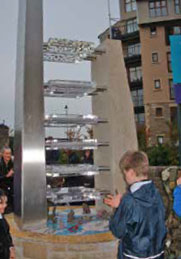Literary Hauntings, A Walking Tour of Lancaster & Its Dark Past
Literary Hauntings
A Walking Tour of Lancaster & Its Dark Past
Tuesday 16th August 2016
Institute for Black Atlantic Research, UCLan
Departs from UCLan, Foster Building at 10am and returns at 6pm.
This is a free tour, so please book early, we have a cap on numbers.
Led by UCLan’s Institute for Black Atlantic Research
For further information & to book your place, please email Dr Theresa Saxon: tsaxon@uclan.ac.uk
Tour led by UCLan academics, experts in Local Heritage. This tour will take visitors on a journey through Lancaster’s hidden history of Black Presence and the literature that recalls it. Our journey spans the period from the early seventeenth to the mid nineteenth century, from black servants through black actors to a famous and celebrated Victorian novelist.
We start with a tour of Lancaster’s famous castle where the early history of Lancaster including the hanging of the famous Pendle witches will be described. Then onto the Quaker Meeting House where in one of the earliest meeting houses of the Quakers we will hear about Quakers who were slaveholders and the history of Quaker abolitionism.
From there we will proceed to Castle Hill to hear the story of the slave-holding Satterthwaite family, the black woman they brought back from St. Kitts and the terrible legacy that haunts us still. In the Priory Church and grounds we witness this haunting in memorials to slaves and their masters.
Then a trip to the memorial to victims of the slave trade on the quayside and the Lancaster Maritime Museum before an afternoon excursion to Sunderland Point and the gravesite of Sambo that is a unique and affecting site with a Romantic poem to boot.
“Full sixty years the angry winter’s wave
Has thundering dashed this bleak and barren shore
Since Sambo’s head laid in this lonely grave
Lies still and ne’er will hear their turmoil more”
Extract from the Grave at Sunderland Point:
We stop at the Lancaster Grand Theatre, where African American actor Ira Aldridge performed, in 1827. Although Britain had passed the Slave Trade Act in 1807, forbidding the trafficking of slaves, British colonies in the sugar plantations of the Caribbean would still operate slavery up until 1833. And of course, in America, slavery would not be abolished until 1865. Ira Aldridge was, therefore, a pioneer of his time.
We will also take a tour through Charles Dickens’ literary Lancaster. Dickens came here with his friend and fellow writer, Wilkie Collins, in September 1857 and wrote about their trip in a short story, “‘The Lazy Tour of Two Idle Apprentices.” Dickens felt the ghostly presence of what was, by 1857, Lancaster’s slavery past. He wrote: “‘The stones of Lancaster do sometimes whisper, even yet, of rich men passed away—upon whose great prosperity some of these old doorways frowned sullen in the brightest weather – that their slave-gain turned to curses.” We will follow the footsteps of these two literary greats through the streets of Lancaster to the Lunatic Asylum where we meet the ghosts of the residents Dickens described as “blighted men-and-women-trees.” Then on to Lancaster Castle where, just before Dickens arrived, Edward Hardman was hanged for the murder of his wife, a ghostly story that haunts Dickens’ tale of Lancaster life.
In October 2005, Lancaster became the first slave port city in Britain to establish a permanent quayside memorial to victims of the slave trade.


